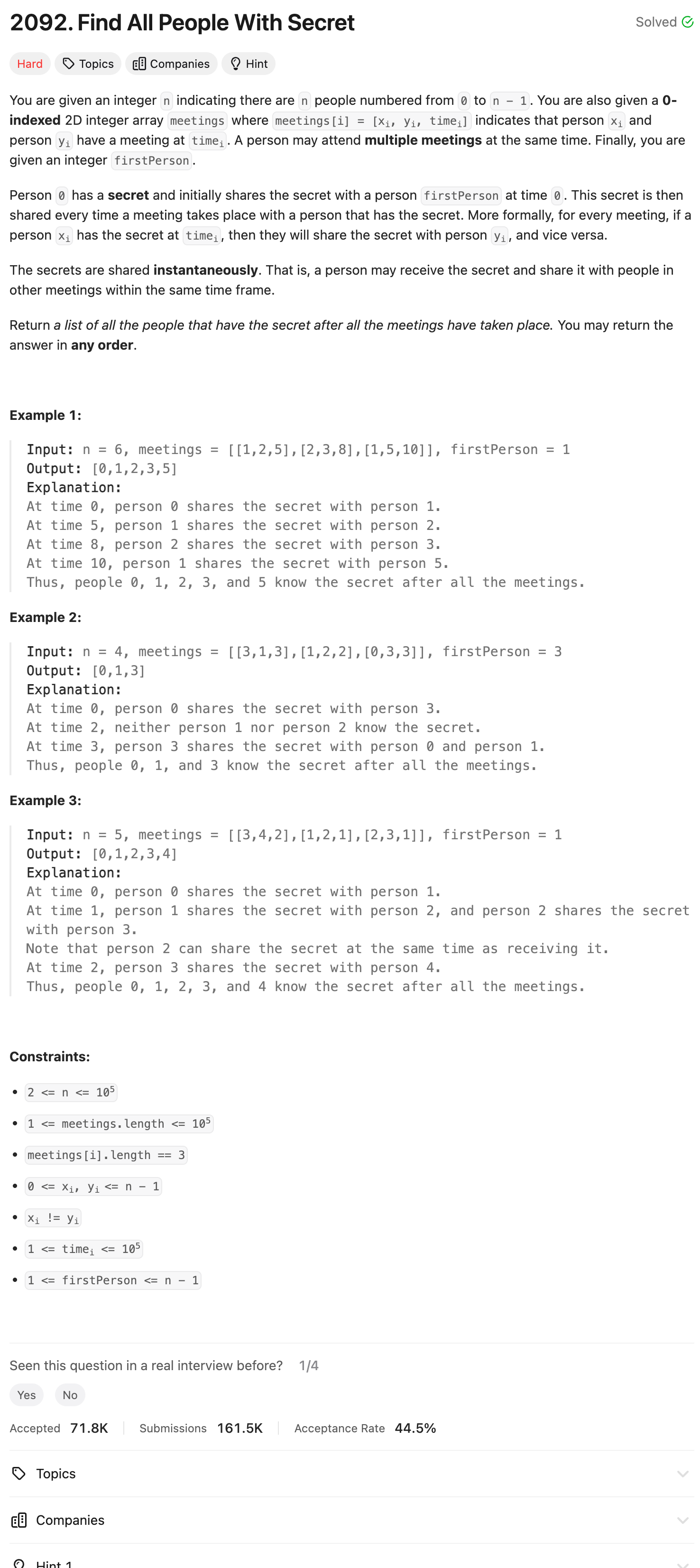Problem of The Day: Find All People With Secret
Problem Statement
Intuition
I’ll start by identifying the key elements in the problem. We need to find all people who attended the same meetings as the given first person. The meetings are represented as time intervals, and each meeting involves two people. We can track the attendees of each meeting over time and update the set of people with whom the given person shares a secret.
Approach
I will use a hash_map to store the meetings at each time point. Then, I’ll iterate through the time points and update the set of secrets by adding people who attended the meetings at that time. I’ll continue this process until no further updates can be made.
Note: This solution may not be the most efficient one, and further optimizations could be explored.
Complexity
-
Time complexity: O(m * n) where n is the number of time points and m is the average number of attendees in a meeting.
-
Space complexity: O(n) where n is the number of time points.
Code
class Solution:
def findAllPeople(self, n: int, meetings: List[List[int]], firstPerson: int) -> List[int]:
secrets = {0, firstPerson}
hash_map = defaultdict(list) # {time_i: {attendants}}
for x, y, time in meetings:
hash_map[time].append([x, y])
max_time = max(hash_map.keys())
for i in range(1, max_time + 1):
if i not in hash_map:
continue
attendants = hash_map[i]
while True:
is_done = True
for x, y in attendants:
if x in secrets or y in secrets:
if x not in secrets or y not in secrets:
secrets.update([x, y])
is_done = False
if is_done:
break
return list(secrets)
Editorial Solution
Approach 1: Breadth First Search
class Solution:
def findAllPeople(self, n: int, meetings: List[List[int]], firstPerson: int) -> List[int]:
# For every person, store the time and label of the person met.
graph = defaultdict(list)
for x, y, t in meetings:
graph[x].append((t, y))
graph[y].append((t, x))
# Earliest time at which a person learned the secret
# as per current state of knowledge. If due to some new information,
# the earliest time of knowing the secret changes, we will update it
# and again process all the people whom he/she meets after the time
# at which he/she learned the secret.
earliest = [inf] * n
earliest[0] = 0
earliest[firstPerson] = 0
# Queue for BFS. It will store (person, time of knowing the secret)
q = deque()
q.append((0, 0))
q.append((firstPerson, 0))
# Do BFS
while q:
person, time = q.popleft()
for t, next_person in graph[person]:
if t >= time and earliest[next_person] > t:
earliest[next_person] = t
q.append((next_person, t))
# Since we visited only those people who know the secret,
# we need to return indices of all visited people.
return [i for i in range(n) if earliest[i] != inf]
Approach 5: Union-Find with Reset
class Solution:
def findAllPeople(self, n: int, meetings: List[List[int]], firstPerson: int) -> List[int]:
# Sort meetings in increasing order of time
meetings.sort(key=lambda x: x[2])
# Group Meetings in increasing order of time
same_time_meetings = defaultdict(list)
for x, y, t in meetings:
same_time_meetings[t].append((x, y))
# Create graph
graph = UnionFind(n)
graph.unite(firstPerson, 0)
# Process in increasing order of time
for t in same_time_meetings:
# Unite two persons taking part in a meeting
for x, y in same_time_meetings[t]:
graph.unite(x, y)
# If any one knows the secret, both will be connected to 0.
# If no one knows the secret, then reset.
for x, y in same_time_meetings[t]:
if not graph.connected(x, 0):
# No need to check for y since x and y were united
graph.reset(x)
graph.reset(y)
# Al those who are connected to 0 will know the secret
return [i for i in range(n) if graph.connected(i, 0)]
class UnionFind:
def __init__(self, nodes: int):
# Initialize parent and rank arrays
self.parent = [i for i in range(nodes)]
self.rank = [0] * nodes
def find(self, x: int) -> int:
# Find the parent of node x. Use Path Compression
if self.parent[x] != x:
self.parent[x] = self.find(self.parent[x])
return self.parent[x]
def unite(self, x: int, y: int) -> None:
# Unite two nodes x and y, if they are not already united
px = self.find(x)
py = self.find(y)
if px != py:
# Union by Rank Heuristic
if self.rank[px] > self.rank[py]:
self.parent[py] = px
elif self.rank[px] < self.rank[py]:
self.parent[px] = py
else:
self.parent[py] = px
self.rank[px] += 1
def connected(self, x: int, y: int) -> bool:
# Check if two nodes x and y are connected or not
return self.find(x) == self.find(y)
def reset(self, x: int) -> None:
# Reset the initial properties of node x
self.parent[x] = x
self.rank[x] = 0
